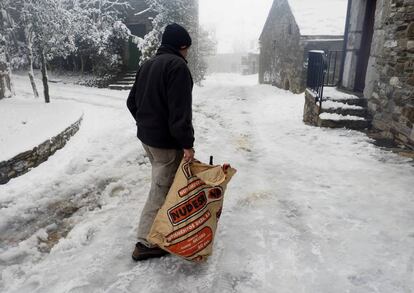Spanish researchers warn of dangers to vulnerable from cold weather
Crisis means growing numbers of elderly and homeless at risk when temperatures plunge

In January 2015, two homeless people died in Valencia after freezing temperatures hit the city. In a country usually associated with sunshine, it’s perhaps unsurprising that until now no study has been made of the effect of the cold in Spain. But a report by researchers at the Madrid-based Carlos III Health Institute shows that deaths as a result of cold weather are as numerous or higher than those brought about by heatwaves, and that these deaths tend to take place in warmer areas of Spain that are unprepared for sudden temperature falls. This new data should be a wake-up call for the authorities at a time when the ongoing economic crisis means growing numbers of households cannot afford to put the heating on, and when homelessness is on the rise.
The report shows that deaths as a result of cold weather are as numerous or higher than those brought about by heatwaves
But as Julio Díaz, who worked on the report, points out, the authorities have done little. “There are no plans to deal with these cold weather snaps,” he says. The report is based on surveys carried out in 52 towns and cities throughout the country between 2000 and 2009 on cold-related deaths. Each city, depending on its location, has its own criteria for activating emergency plans. In Ávila – Spain’s highest city, located some 1,131 meters above sea level on the central Castilian plains, and where the average winter temperature is around 5ºC – that means when the thermometer falls to -10ºC. But in the southern city of Cadiz, anything lower than 6ºC is considered serious; in Madrid, the authorities take measures to help the vulnerable when the temperature falls to below -2ºC.
That’s to say, cold can kill even in warmer areas, but the real danger comes when the temperature goes back up. “We’ve seen this in other surveys comparing Greece to Sweden, for example. In warmer countries they are not used to the cold, but they are in Scandinavia,” says Díaz, who is also head of Epidemiology and Biostatistics at the National Health School. People in areas that do not get so cold are not as well adapted to the low temperatures, and nor are their homes, which typically are not heated or sufficiently insulated to deal with sudden cold snaps.
During heatwaves the vulnerable tend to die almost immediately, “while it usually takes at least a week before people die from the cold”
The researchers also noted other important factors, such as overall poverty in a city, as well as the average age. The elderly are particularly vulnerable to cold weather conditions, as are those with long-term health problems.
Díaz and his fellow researchers have also carried out similar surveys on mortality rates during heatwaves, noting that the vulnerable tend to die almost immediately, “while it usually takes at least a week before people die from the cold,” he says. The Health Ministry has acted on the team’s work on how to save lives when the temperatures soar, and Díaz now hopes it will take on board its recommendations on preventing deaths during the worst days of winter.
“Mortality levels due to heat are falling because plans, warnings and prevention measures are in place. But nothing has been prepared to deal with cold spells, which kill as many, if not more people, in Spain,” says Díaz. His team has just published another survey, this time focused on Madrid, which shows that the risk of dying in a cold spell has tripled among the over-75s compared to just a couple of decades ago. Equally, the risk of dying during a cold spell has doubled for the over-45s compared to the 1980s and 1990s.
The risk of dying in a cold spell has tripled among the over-75s compared to just a couple of decades ago
The team’s study at the national level shows that because deaths from cold tend to take place during relatively short, intense periods, if regional governments throughout Spain took action to combat the effects of sudden periods of bad weather they would be much more effective than similar measures to deal with heatwaves. According to climate change experts, the planet will continue to experience sudden cold snaps even while overall temperatures rise.
“In Spain we’re aware of the dangers from heatwaves and we take measures to protect the vulnerable. Perhaps we don’t have the same perception of cold and need to become more aware,” says Xavier Basagaña, an epidemiologist at the Pompeu Fabra University’s Research Center Environmental Epidemiology (CREAL). “We need long-term plans that work on people who are isolated, along with measures to help people who cannot afford to put the heating on,” he says.
Tu suscripción se está usando en otro dispositivo
¿Quieres añadir otro usuario a tu suscripción?
Si continúas leyendo en este dispositivo, no se podrá leer en el otro.
FlechaTu suscripción se está usando en otro dispositivo y solo puedes acceder a EL PAÍS desde un dispositivo a la vez.
Si quieres compartir tu cuenta, cambia tu suscripción a la modalidad Premium, así podrás añadir otro usuario. Cada uno accederá con su propia cuenta de email, lo que os permitirá personalizar vuestra experiencia en EL PAÍS.
¿Tienes una suscripción de empresa? Accede aquí para contratar más cuentas.
En el caso de no saber quién está usando tu cuenta, te recomendamos cambiar tu contraseña aquí.
Si decides continuar compartiendo tu cuenta, este mensaje se mostrará en tu dispositivo y en el de la otra persona que está usando tu cuenta de forma indefinida, afectando a tu experiencia de lectura. Puedes consultar aquí los términos y condiciones de la suscripción digital.









































